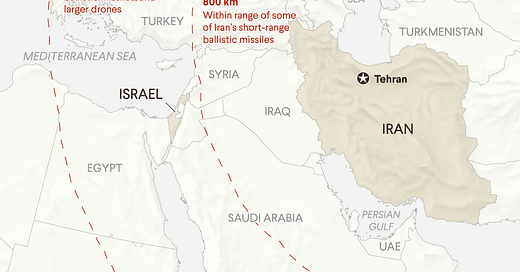The Enemy Gets a Vote
Israel's attempt to destroy Iran's nuclear program may well serve to accelerate it
As noted on Thursday in the lead up to attack, without direct U.S. involvement, Israel lacks the type of bombs it would likely need to penetrate deeply enough to fully destroy the underground nuclear facilities at Natanz and certainly Fordow as it is buried deep inside a mountain. This probably remains true even with repeated follow on attacks (unless, of course, the Israelis have some kind of clever plan for Fordow). Physics is hard to beat.
A second factor is progress already made. As I mentioned, I’d been personally skeptical weeks ago when CNN posted splashy headlines about Israel “preparing for an attack”, because Israel has been doing that for at least as long as Iran has been “weeks away from a nuclear breakout” and that’s been the case for the better part of twenty years.
But in addition to the acute warning signs of U.S. personnel evacuations and UK ships being warned to avoid the Straight of Hormuz, the IAEA (International Atomic Energy Agency) report released just days prior also indicated that substantive elements of Iran’s nuclear enrichment program having reached far greater levels of enrichment capacity (perhaps 50-60 times faster to reach weapons grade than was the case during the JCPOA negotiations a decade ago). Iran also has new systems that enable it to more easily enrich covertly. The regime has also stopped reporting and complying with key inspection and verification. Finally, advancements in Iran’s ballistic missile program over the years have also advanced quite meaningfully. So while it’s true that Iran has been “close to a weapon” for nearly two decades, it is now close-close and it is no longer hiding its intent behind a veil of purported civilian-only use. The conclusions in the IAEA report provided the casus belli for war.
The time required to produce enough fissile material has certainly condensed, but to my knowledge, our awareness of their current ability or plan to weaponize that material remains murky - at least publicly. Here I think the context is important. We’re talking about a problem that scientists were able to solve at a small base out in the desert in the 1940s. Iran has spent twenty years - to one degree or another - investing and working out their solutions to these challenges. Lesser states such as North Korean and Pakistan have sorted it out over time through various means. So when we step back and look toward the future, it cannot be readily dismissed as an ongoing threat, even as air strikes destroy and degrade Iran’s main enrichment and research facilities. What we can know for sure is that the appeal of having a nuclear deterrent - like right now - has probably gone up for Iran’s leaders, not down.
Iran’s enrichment program has moved fully towards the production and stockpiling of 60% enriched uranium (which has no civilian use), advancements in their centrifuges are 50-60 times more efficient than they were a decade ago, the knowledge is there, and the means of delivery are also there.
Israel’s intelligence operations around this issue are the last on earth one should underestimate and they have had success over the years in targeting Iranian nuclear scientists directly. Both should serve to limit the effectiveness of Iran’s ability to covertly enrich and at this point build weapons, but absent successful regime change, the challenge Israel is facing may be more akin to wack-a-mole over time than fish in a barrel once.
Iran’s air defenses have been materially degraded and / or rendered ineffective through jamming and stealth, thus allowing the Israelis to conduct bombing runs with relative impunity, but for a variety of reasons, a large scale ground invasion to remove the Iranian regime remain inconceivable. Iran is a very large country by landmass, with mountainous terrain and conventional forces that are much, much larger than Israel’s. And we can remain fairly confident, I believe, that there is little appetite from Mr. Trump to be involved in any invasion.
So, in short, while there may feel like a sense of finality to the Israeli attacks and they are certainly finally doing it, this issue will likely continue festering. Iran is without question the weakest it’s been in decades. That weakness will likely enable Israeli operations for some time to come, but the mitigating factors agains being able to “finish the job” as Mr. Netanyahu has stated as his objective, are material. The enemy gets a vote.




100% agree. I think it’s possible they already have a gun-style weapon like the Little Boy. They don’t need to test it, they know it will work. But then I start thinking of Daniel Ellsberg’s book Doomsday Machine and how having a nuclear arsenal comes with lot of logistics to keep it from becoming unintentionally self-inflicting. And I wonder if in their rush to push things ahead they could forgo the kind of precautions others have made. Like the Enola Gay taking out the cordite bags before taking off just in case the plane crashed on take-off sort of thing. It requires cool heads, and I don’t think there are a lot of them in Iran right now.